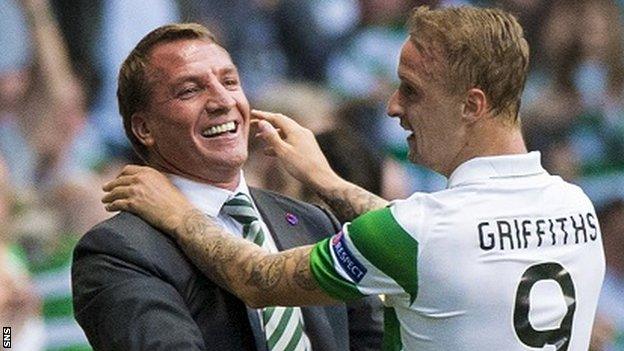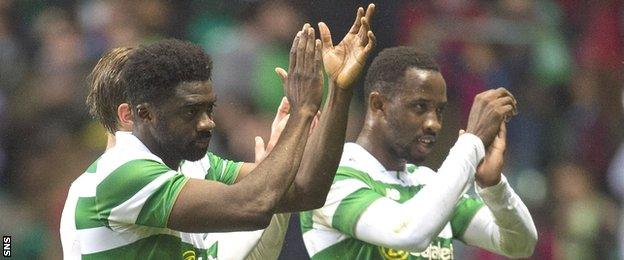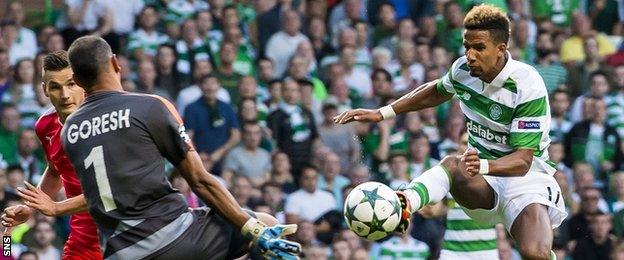Brendan Rodgers: Celtic make progress under impact of manager's influence
- Published

Brendan Rodgers appears to have inspired Celtic players like Leigh Griffiths
History barged back into the midst of Celtic's adventures in Europe, but the disruption was only fleeting. The manager, Brendan Rodgers, was unmoved, even if conceding two goals at Celtic Park in the Champions League play-off round was a reminder of old frailties.
His predecessor, Ronny Deila, never wholly recovered from the two goals for Malmo in Celtic's 3-2 win in Glasgow 12 months ago that contributed to them being knocked out in the second leg. Memories of that night resurfaced as Hapoel Beer Sheva scored twice at the beginning of the second half to reduce Celtic to a one-goal lead.
Under Rodgers, though, this Celtic side already has a different mentality and personality. Only three of the 14 players involved in the 5-2 first-leg win are new signings, but there was an entirely different reaction to a costly spell of uncertainty.
'We could have crumbled and a year ago we would have done' - Leigh Griffiths
Rodgers has worked on the character of his team. Recruitment will be a careful, measured process, with only Kolo Toure, Scott Sinclair and Moussa Dembele having joined the squad so far, which means the manager has to carry out the best of his work on the training ground and in the dressing room.
A fragile will has been a trait of this Celtic side, particularly when the defence was under pressure in Europe. That flaw hasn't wholly been eradicated, but it did not undermine the team against Hapoel as it did under Deila.

Kolo Toure and Moussa Dembele joined Celtic this summer
When the Israeli champions scored twice in two minutes at Celtic Park, the players responded by reacting to Rodgers' instructions rather than instinct. He has coached the players to be positive and bold - a reflection of his own qualities as a manager - in the event of a setback.
Rather than apprehension, the players' mindset was to regroup, using cues the manager has emphasised in training, most notably focusing on ball retention and ensuring the shape of the team is right.
Losing a goal is a trigger point to resetting the side and going again, an approach that was supported by the tactical decisions the manager made.
'We know that we perform best when we are on the front foot' - Mikael Lustig
Rodgers has displayed a shrewd and calculating mind this season. He has switched formation, tactics and personnel to alter the flow and momentum of games - and influence the outcome.
With 20 minutes left against Hapoel, and the scoreline 3-2, he contemplated a substitution. After toying with the notion of taking off centre-back Eoghan O'Connell and switching to a back three, he opted to replace attacking midfielder Tom Rogic. Either way, the decision was to provide Celtic with another attacking option, since the player coming on was a striker, Dembele.
Rodgers wanted to be proactive when some managers would have sought comfort in a more conservative approach. He was calm amid the moments of bedlam in the match.

Scott Sinclair (right) is central to the style Rodgers is adopting at Celtic
That composure was transferred to his players and, coupled with an attacking, assertive philosophy, was fundamental to the resurgence that led Celtic to two more goals.
Pace is a vital part of the team's identity, with Rodgers insisting that circulating possession is important - and also buys time to restore order to minds scrambled by events in a game - but only if it is also the precursor to penetrating opponents, which is where the pace and ball-carrying of Sinclair, James Forrest and Leigh Griffiths become central.
Celtic are set up to attack, to think and act positively - as Rodgers does relentlessly himself, even in press conferences - whereas under Deila there seemed to be a constant sense of doubt. Rodgers has swiftly sought to eradicate that insecurity.
'We're a different team. We showed that we could dig in' - James Forrest
Rodgers is very demanding of all the staff at Celtic, more so than any manager since Martin O'Neill, insisting that they operate to the standards that he sets. It is not a dogmatic style, though, since he wants to encourage players to be confident and bold.
Sinclair played the best football of his career under Rodgers at Swansea and has a bond with the manager. Individuals can thrive under Rodgers and Forrest is in resurgent form compared to recent seasons.
Scott Brown, too, is also playing with a renewed zeal, although that in part is because he is not carrying an injury, as he was for much of the last campaign. Rodgers manages to combine being a leader as well as a mentor though.

Scott Brown and James Forrest have had a revival of form under Rodgers
He may not have been the only manager to delay training on Tuesday to allow players with children starting school to share that time with their family, but it was significant the day before a critical Champions League tie.
There was a positive response from the players and, when Griffiths scored the first of his two goals against Hapoel, he ran to Rodgers to celebrate. The manager could have demanded an overhaul of the squad when he arrived, but he has been prepared to trust in those players he can see potential and worth in, regardless of their age or recent form.
As well as Forrest, fellow academy graduate Callum MacGregor has featured regularly, Kieran Tierney continues to progress and, several rough edges apart, O'Connell has done okay in defence.
Rodgers is at the outset of his Celtic career, but he has made an immediate impact.
- Published14 January 2018
- Published7 June 2019
